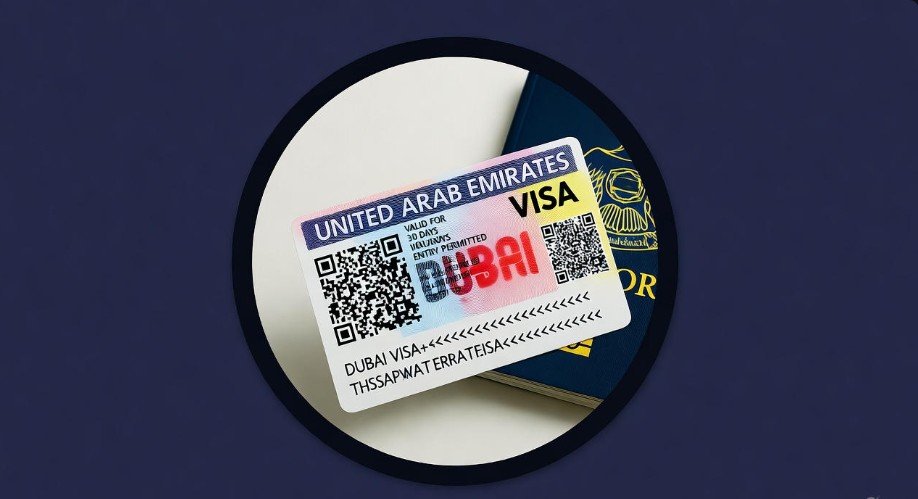Dubai Visa: Your Essential Guide

Dubai Visa: Your Essential Guide
Navigating the Dubai visa application process is straightforward with this guide. Learn about requirements, types of visas, and how to apply step-by-step for a smooth entry into Dubai.
Key Takeaways
- Determine your visa eligibility and type.
- Gather all required documents accurately.
- Apply through an authorized sponsor or online.
- Submit your application well in advance.
- Prepare for entry with your approved visa.
Planning a trip to Dubai is exciting, but understanding the visa requirements can feel a bit overwhelming. Many travelers, especially those from countries not on the visa-waiver list, wonder about the exact steps needed to enter the United Arab Emirates (UAE). You might be a tourist looking forward to exploring the city’s wonders, a business professional attending a conference, or a family member visiting loved ones. Whatever your reason, securing the correct Dubai visa is your first and most crucial step. This guide will break down the process into simple, manageable steps, ensuring your journey to Dubai is as smooth as a luxury drive. Get ready to discover how easy it can be to obtain your Dubai visa!
Understanding Dubai Visa Requirements for Travelers

Before you start packing your bags for the dazzling city of Dubai, it’s essential to understand the visa requirements that apply to you. The United Arab Emirates (UAE) has specific entry rules for visitors, and knowing these upfront will save you time and potential headaches. The good news is that for many nationalities, the process is quite streamlined.
Visa-Free Entry to Dubai
Many travelers can enter Dubai without needing to apply for a visa beforehand. This typically applies to citizens of the European Union, the United States, the United Kingdom, Canada, Australia, and several other countries. For these nationalities, a visa-on-arrival is usually granted, allowing a stay of 30 to 90 days, depending on your passport.
It’s always best to check the latest official information from the UAE government portal to confirm if your country is on the visa-free list and the exact duration of stay permitted.
When You Need a Dubai Visa
If your nationality is not on the visa-exempt list, or if you plan to stay longer than the permitted visa-free period, you will need to apply for a visa before your arrival. This includes individuals who wish to work, study, or reside in Dubai long-term. The UAE offers various visa types to cater to different purposes of visit.
Types of Dubai Visas: Which One Is Right for You?
Dubai offers a range of visa options to suit diverse travel needs. Choosing the correct visa type is fundamental to a successful application and a hassle-free journey. Here’s a breakdown of the most common visa categories:
Tourist Visas
These are the most common visas for individuals visiting Dubai for tourism, leisure, or visiting friends and family.
- 30-Day Tourist Visa: Ideal for short stays, this visa allows you to explore Dubai’s attractions for up to 30 days. It is usually extendable for another 30 days.
- 60-Day Tourist Visa: For those who want a more extended holiday, this visa permits a stay of up to 60 days and can also be extended.
Business Visas
If you are traveling to Dubai for business meetings, trade fairs, or to explore investment opportunities, a business visa is appropriate. These are often sponsored by a UAE-based company or a business event organizer.
Transit Visas
These short-term visas are for travelers who need to transit through Dubai’s international airports.
- 48-Hour Transit Visa: Allows you to leave the airport and explore the city for up to 48 hours.
- 96-Hour Transit Visa: For longer layovers, this visa permits a stay of up to 96 hours. You must have a confirmed onward ticket.
Other Visa Categories
Dubai also offers specialized visas for specific purposes:
- Student Visas: For individuals enrolled in educational institutions in Dubai.
- Work Visas/Employment Permits: Required for those who have secured a job offer in Dubai. These are typically sponsored by the employer.
- Residence Visas: For individuals who intend to live in Dubai long-term, often sponsored by an employer, family member, or through investment.
- Golden Visa: A long-term residency visa for investors, entrepreneurs, specialized talents, and talented students.
The application process and required documents can vary significantly between these visa types. Therefore, identifying your purpose of visit is the first step in narrowing down your visa options.
The Dubai Visa Application Process: A Step-by-Step Guide
Applying for a Dubai visa can seem complex, but by following these steps, you can navigate the process with confidence. It’s important to note that individuals typically cannot apply for a Dubai visa directly. You will need a sponsor.
Step 1: Identify Your Sponsor
For most visa types (excluding visa-free nationalities), you will need a sponsor. A sponsor is an entity or individual who guarantees your stay in the UAE. Common sponsors include:
- An Airlines: If you book your flight through airlines like Emirates or Etihad, they can often sponsor your visa.
- A Hotel: Some hotels in Dubai offer visa sponsorship when you book your accommodation with them.
- A Tour Operator or Travel Agency: Many reputable travel agencies specializing in UAE tourism can arrange your visa.
- A UAE-Based Company: If you are traveling for business or employment, the company inviting you will act as your sponsor.
- A UAE Resident Family Member: For family visits, a UAE resident relative can sponsor your visa.
Your sponsor will play a key role in submitting your application and providing the necessary guarantees.
Step 2: Gather Required Documents
The documents needed will depend on your nationality and the type of visa you are applying for. However, common requirements include:
- Passport: Your passport must be valid for at least six months beyond your intended stay and have at least one blank page for the visa stamp.
- Passport-Sized Photographs: Recent, clear photographs meeting UAE visa photo specifications (usually white background, specific dimensions).
- Visa Application Form: Duly completed application form provided by the sponsor or immigration authority.
- Proof of Accommodation: Hotel booking confirmation or sponsorship letter from your resident host.
- Flight Itinerary: Confirmed return or onward flight tickets.
- Sponsorship Letter: If sponsored by a company or resident.
- Financial Proof: Sometimes, proof of sufficient funds may be required.
- Medical Certificate: For longer-term visas like residence or work visas, a medical fitness certificate from a UAE-approved health center is mandatory.
Always confirm the exact list of required documents with your sponsor to avoid any delays.
Step 3: Submit Your Application
Your sponsor will typically submit your visa application on your behalf. This is often done through:
- Online Portals: Many airlines and travel agencies have online systems where you can upload your documents and track your application. The Federal Authority for Identity, Citizenship, Customs & Port Security (ICP) also offers online services.
- Immigration Departments: In some cases, the sponsor might submit the application directly to the General Directorate of Residency and Foreigners Affairs (GDRFA) in Dubai.
Ensure all information provided is accurate, as any discrepancies can lead to rejection.
Step 4: Visa Processing and Approval
The processing time for Dubai visas can vary from a few hours to several business days, depending on the visa type, nationality, and current application volumes. Once approved, the visa is usually issued electronically and sent to you and your sponsor.
Step 5: Entry into Dubai
Upon arrival at Dubai International Airport (or any other UAE port of entry), present your passport and the electronic visa copy to the immigration officers. Some nationalities might have their biometric data (fingerprints and photograph) taken.
Pro Tip: Always print a physical copy of your visa and keep it with your passport. It’s also wise to have digital copies readily accessible on your phone.
Dubai Visa Fees and Processing Times
The cost and time it takes to get a Dubai visa can differ based on several factors, including the visa type, your nationality, and the service provider. It’s crucial to factor these into your travel planning.
Visa Fees
Visa fees are generally non-refundable, even if your application is denied. They typically cover the application processing and the visa itself. Here’s a general idea of how fees are structured:
| Visa Type | Typical Fee Range (USD) | Notes |
|---|---|---|
| 30-Day Tourist Visa | $80 – $150 | Can vary based on sponsor and extension options. |
| 60-Day Tourist Visa | $150 – $250 | Generally more expensive than the 30-day option. |
| 96-Hour Transit Visa | $50 – $75 | Often offered by airlines to their passengers. |
| Service Charges | Varies | Travel agencies and airlines may add their service fees. |
These figures are approximate and subject to change. Always confirm the exact fees with your chosen sponsor or service provider.
Visa Processing Times
The speed of your visa approval depends heavily on the application’s completeness and the authorities’ workload.
| Visa Type | Standard Processing Time | Express Processing Time |
|---|---|---|
| Tourist/Transit Visas | 3-5 business days | 24-48 hours (additional fees apply) |
| Work/Residence Visas | 5-10 business days | Not always available, can be longer. |
It is highly recommended to apply for your visa at least 2-3 weeks before your intended travel date to allow ample time for processing and to account for any unforeseen delays. Public holidays in both your home country and the UAE can also impact processing times.
Tips for a Smooth Dubai Visa Application
To make your Dubai visa application as seamless as possible, consider these helpful tips:
- Apply Early: Don’t wait until the last minute. Start the process well in advance of your trip.
- Double-Check Information: Ensure all details on your application form and supporting documents match your passport exactly. Even a minor spelling error can cause issues.
- Choose a Reputable Sponsor: Select well-known airlines, hotels, or travel agencies for sponsorship. Unverified sources can lead to fraudulent visa applications.
- Understand Photo Requirements: Adhere strictly to the UAE’s passport photo specifications. Incorrect photos are a common reason for rejection.
- Keep Copies: Make copies of all submitted documents and your visa once approved.
- Stay Updated: Visa regulations can change. Always refer to the latest official guidelines or consult with your sponsor.
Pro Tip: If you are using a travel agency, confirm what happens if your visa is denied. Some agencies offer refunds or will help you reapply, while others do not.
Frequently Asked Questions About Dubai Visas
Here are some common questions travelers have about obtaining a Dubai visa:
1. Can I apply for a Dubai visa myself?
Generally, individuals cannot apply for a Dubai visa directly. You usually need a sponsor, such as an airline, hotel, or a UAE-based company, to apply on your behalf.
2. How long is a Dubai visa valid for?
Visa validity depends on the type of visa issued. Tourist visas are typically valid for 30 or 60 days from the date of issue, and they allow you to stay in the UAE for that duration. Entry must usually be within 58-60 days of issuance.
3. What happens if my Dubai visa expires while I am in the UAE?
Overstaying your visa can result in fines and potential entry bans. If you need to stay longer than permitted, you must apply for an extension before your current visa expires. Seek advice from your sponsor or the GDRFA.
4. Do children need a separate visa for Dubai?
Yes, all individuals, including infants and children, require their own visa if their nationality is not visa-exempt. Children are usually included on their parent’s visa application if they are traveling together and sponsored by the same entity.
5. Can I change my visa type without leaving the UAE?
In some cases, it is possible to change your visa status without exiting the country. This usually applies to tourist visas when transitioning to a residence or work visa. However, there are specific procedures and fees involved, and it’s best to consult with the immigration authorities or your sponsor.
6. How can I check the status of my Dubai visa application?
If your application is processed through an airline or travel agency, they usually provide a way to track the status online. For applications submitted via the ICP portal, you can often check the status through their official website.
7. What if my passport is lost or stolen while I am in Dubai?
If your passport is lost or stolen, you must report it immediately to the nearest police station and your country’s embassy or consulate in Dubai. You will need a police report to apply for an emergency travel document from your embassy to return home.
Conclusion
Embarking on a journey to Dubai is an exciting prospect, and with the right preparation, securing your visa is a manageable step. From understanding visa-free entry for numerous nationalities to navigating the application process through a sponsor for others, this guide has provided a comprehensive overview. Remember to identify your visa type, gather all necessary documentation accurately, and submit your application well in advance through a trusted sponsor.
By following these guidelines and paying attention to detail, you can ensure a smooth and stress-free visa application, paving the way for an unforgettable experience in the vibrant city of Dubai. Safe travels!





